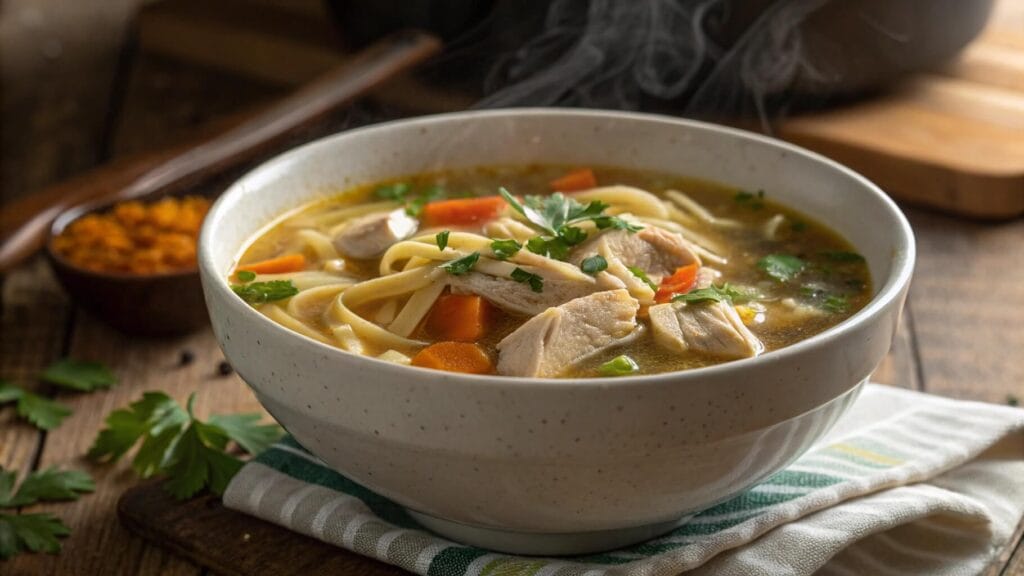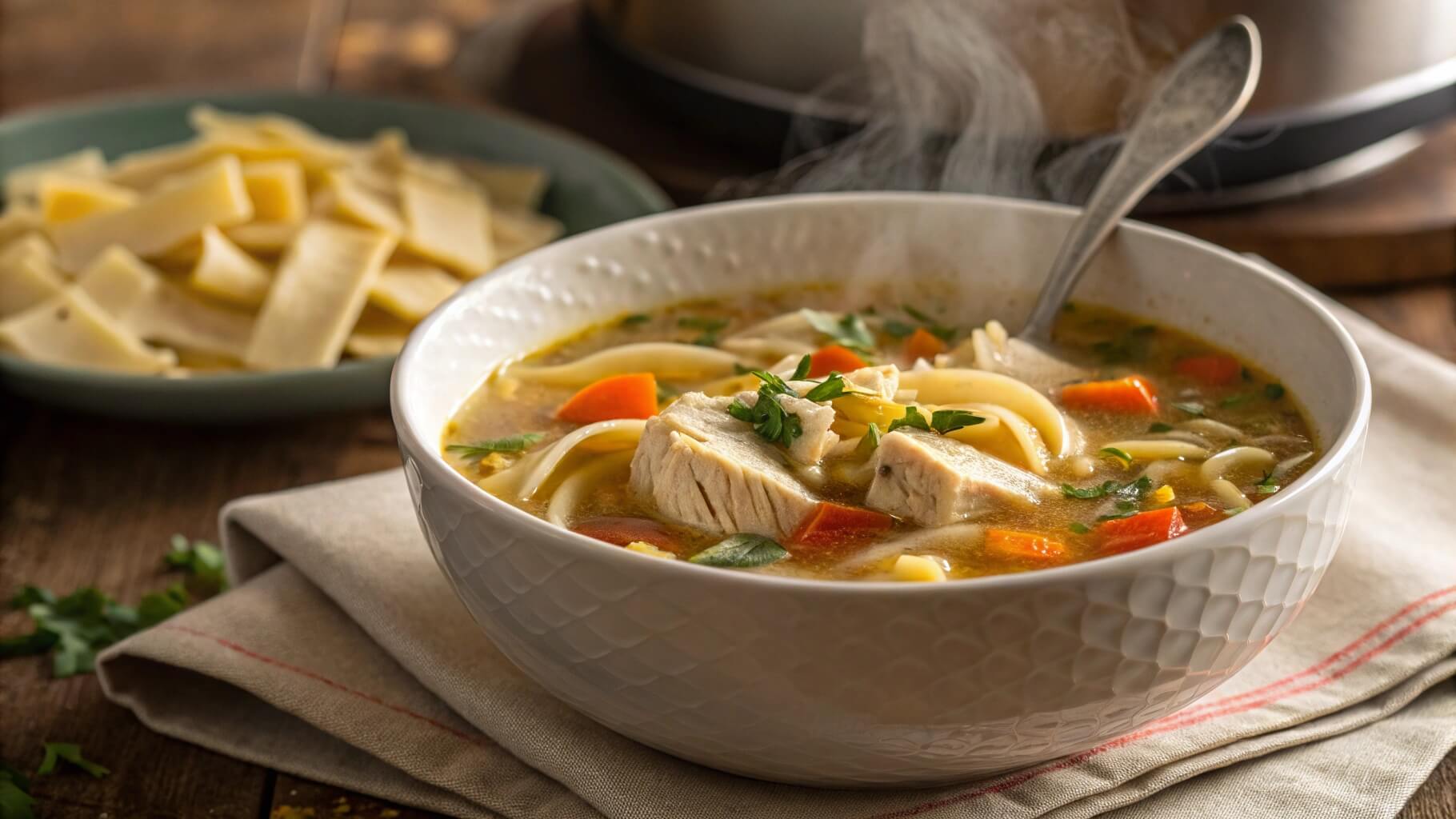The Science Behind Vinegar in Cooking
Vinegar has been used in cooking for centuries. But what makes it so special? It all comes down to acidity. The acidic nature of vinegar plays a key role in balancing flavors and enhancing taste.
When you add vinegar to a dish, it interacts with other ingredients. This creates a harmonious balance between sweet, salty, bitter, and sour flavors. For example, in a dish like chicken noodle soup, vinegar can cut through the richness of the broth. It makes the flavors pop without overpowering them.
Vinegar also affects food on a chemical level. Its acidity can break down proteins, making meat more tender. This is why it’s often used in marinades. Additionally, vinegar slows the growth of bacteria, acting as a natural preservative. These properties explain why many chefs swear by it in their recipes.
So, why add vinegar to chicken noodle soup? It’s simple. The acidity enhances flavor and brings depth to the dish, making it more satisfying with every bite.
Enhancing Flavor With Vinegar
Cooking with vinegar is one of the easiest ways to enhance flavor. But how does it work? The secret lies in the way vinegar interacts with taste receptors on your tongue.
- Balancing Sweetness: Soups like chicken noodle often have sweet undertones from carrots or onions. Vinegar helps balance this sweetness, preventing the dish from becoming too cloying.
- Boosting Saltiness: If your soup tastes flat, a splash of vinegar can amplify the salty flavors. This creates a more robust and layered taste.
- Adding Complexity: Vinegar brings a hint of tanginess that adds complexity. This elevates simple dishes like chicken noodle soup to restaurant-quality meals.
It’s also important to add vinegar at the right time. Stirring it in during the final minutes of cooking preserves its bright, fresh flavor. Why add vinegar to chicken noodle soup? Because it’s the easiest way to take the dish from good to unforgettable.
Health Benefits of Adding Vinegar to Soup
Adding vinegar to your soup isn’t just about taste. It also offers numerous health benefits. Here are some reasons to include vinegar in your cooking:
- Aids Digestion: Vinegar’s acidity helps break down food in your stomach. This makes it easier for your body to absorb nutrients.
- Stabilizes Blood Sugar: Research shows that vinegar can help control blood sugar levels. This is especially beneficial for people with diabetes.
- Rich in Antioxidants: Some types of vinegar, like apple cider vinegar, are high in antioxidants. These compounds protect your body from damage caused by free radicals.
- Low in Calories: Unlike heavy cream or butter, vinegar adds flavor without extra calories. This makes it a great choice for healthier cooking.
So, why add vinegar to chicken noodle soup? It’s not just about enhancing taste. It’s also about creating a meal that supports your overall health.
Types of Vinegar to Use in Chicken Noodle Soup
Not all vinegars are created equal. Choosing the right one for your soup is essential. Here are some popular options and how they impact the flavor:
- Apple Cider Vinegar: This type is slightly sweet and fruity. It’s a great choice for chicken noodle soup because it complements the broth’s natural flavors.
- White Vinegar: This is the most common type. It has a clean, sharp taste that brightens up the soup without adding extra flavors.
- Rice Vinegar: With its mild and slightly sweet taste, rice vinegar is perfect for a lighter soup. It adds subtle acidity without overpowering the dish.
- Balsamic Vinegar: This vinegar is rich and complex. While it’s less traditional for chicken noodle soup, a small amount can add depth.
- Red Wine Vinegar: If you want a tangier soup, red wine vinegar is a bold option. However, use it sparingly to avoid overpowering the other flavors.
Each type of vinegar brings something unique to the table. So, why add vinegar to chicken noodle soup? The right vinegar can transform your soup, making it more flavorful and satisfying.
Tips for Using Vinegar in Chicken Noodle Soup
Using vinegar in soup might seem straightforward, but a few tips can help you get it right:
- Start Small: Always start with a small amount of vinegar. You can add more if needed, but too much can overpower the soup.
- Add Gradually: Taste as you go. This helps you find the perfect balance of acidity.
- Pair With Fresh Herbs: Vinegar works well with fresh herbs like parsley or thyme. Together, they create a bright, fresh flavor.
- Avoid Overcooking: Adding vinegar too early can dull its flavor. Add it toward the end of cooking for the best results.
By following these tips, you’ll understand why adding vinegar to chicken noodle soup is a game-changer. It’s all about enhancing flavor without masking the natural goodness of the ingredients.

How Much Vinegar Should You Add?
Adding vinegar to chicken noodle soup can completely change its taste. But it’s important to add the right amount. Adding too much vinegar can make the soup too sour, while too little might not bring out the flavors properly.
Here are some tips to help:
- Start with one teaspoon of vinegar per serving of soup. This amount is small but noticeable.
- Taste the soup after adding the vinegar. If you want a stronger tang, add another half teaspoon.
- Use measuring spoons to avoid over-pouring. This helps keep the flavor balanced.
Transitioning to the next step, consider the type of vinegar. Different kinds, such as apple cider vinegar or white vinegar, have varying strengths. Keep in mind, lighter soups may require less vinegar than heavier ones. By starting small and adjusting, you can achieve the perfect flavor without overpowering your dish.
Step-by-Step Guide: Adding Vinegar to Chicken Noodle Soup
Wondering why add vinegar to chicken noodle soup? The answer lies in its ability to balance flavors and enhance taste. Let’s go step by step:
- Prepare the Soup: Before adding vinegar, make sure your chicken noodle soup is cooked and ready. Ensure the broth has simmered long enough to develop flavor.
- Choose the Vinegar: Select a type of vinegar. Apple cider vinegar is popular because it adds a mild tang. White vinegar provides a sharper taste.
- Add Small Amounts: Pour a teaspoon of vinegar into the soup. Stir well so the vinegar mixes evenly.
- Taste the Soup: Take a small sip to check the balance. If the flavor feels too mild, add another half teaspoon and stir.
- Adjust Further: Stop adding vinegar once the soup has a bright and slightly tangy taste. Avoid making it too sour.
The reason why add vinegar to chicken noodle soup is its effect on flavor. It not only adds tanginess but also highlights other ingredients like herbs and chicken. Following these steps ensures a well-balanced soup with just the right amount of zing.
Common Mistakes to Avoid
When adding vinegar to chicken noodle soup, certain mistakes can ruin the taste. Here are some common ones and how to avoid them:
- Adding Too Much at Once: Pouring in too much vinegar can make the soup sour. Always add it slowly, in small amounts.
- Skipping the Taste Test: Not tasting the soup after each addition of vinegar is a mistake. Without tasting, you might end up overdoing it.
- Using Strong Vinegars: Strong varieties, like balsamic vinegar, can overpower the soup. Stick to lighter options like apple cider vinegar.
- Adding Vinegar Too Early: If you add vinegar while the soup is still cooking, it might lose its brightness. Add it at the end for the best flavor.
- Ignoring Balance: Remember, vinegar is just one component. Balancing it with salt, herbs, and spices is key.
These mistakes are easy to avoid when you’re mindful. By understanding why add vinegar to chicken noodle soup, you can enhance your dish without making it too tangy or overwhelming.
FAQs
Why add vinegar to chicken soup?
Adding vinegar to chicken soup enhances the flavor by balancing the broth’s richness with a touch of acidity. Moreover, it helps to extract nutrients from the bones and vegetables during cooking, making your soup both tastier and more nutritious. This simple addition can elevate a basic recipe to a whole new level of complexity.
Why do chefs put vinegar in soup?
Chefs often add vinegar to soup because it brings harmony to the dish by cutting through fats and intensifying the flavors of other ingredients. The acidity complements the natural sweetness of vegetables and enhances the umami of proteins, creating a well-rounded and satisfying taste. Additionally, it’s an easy way to add depth without overpowering the dish.
What is the role of vinegar in noodles?
In noodle dishes, vinegar acts as a flavor enhancer, providing a pleasant tang that balances the saltiness and richness of the broth or sauce. It also adds a refreshing sharpness that complements the chewy texture of the noodles. Whether it’s a soup or a stir-fry, a splash of vinegar ties all the flavors together beautifully.
What does white vinegar do for soup?
White vinegar sharpens the flavor of soup by introducing a clean and bright acidity. It helps to cut through heavy or greasy elements, leaving the soup tasting lighter and more refreshing. Additionally, it accentuates the natural flavors of the ingredients, making the dish more vibrant and appealing.
Conclusion
Adding vinegar to chicken noodle soup is a simple way to boost flavor. It brings brightness and balance, making your soup more enjoyable. The key is to start with small amounts, taste as you go, and avoid common mistakes. By following these tips, you’ll see why adding vinegar to chicken noodle soup can transform an ordinary meal into something extraordinary. For more tips on perfecting chicken dishes, check out this guide on troubleshooting tough Instant Pot chicken.
Remember:
- Start with one teaspoon of vinegar per serving.
- Choose lighter vinegars for the best results.
- Add vinegar at the end for a brighter taste.
With these steps, you’ll always have a delicious and well-balanced chicken noodle soup.


1 thought on “Why Add Vinegar to Chicken Noodle Soup? Unlock Flavor & Health”